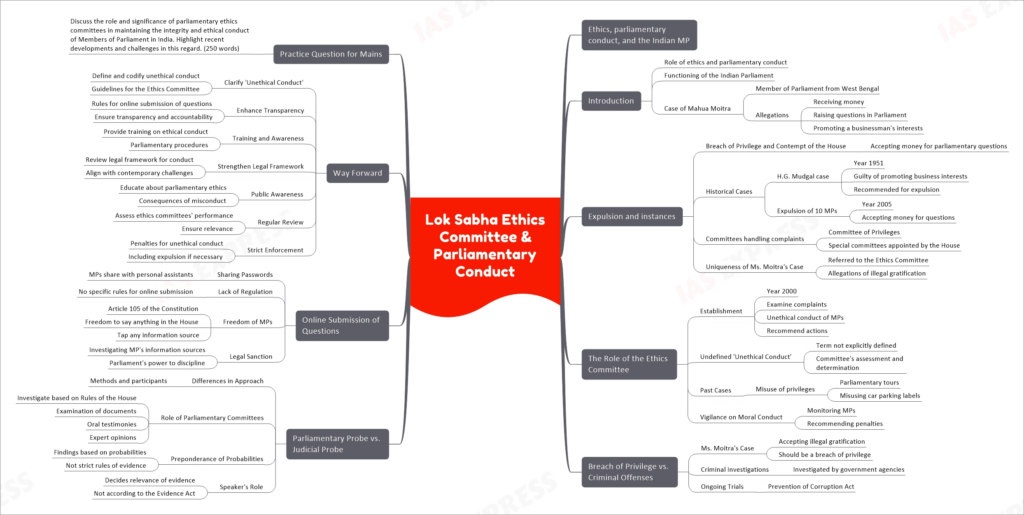Parliamentary Ethics Committee & Parliamentary Conduct: A Critical Analysis
This topic of “Parliamentary Ethics Committee & Parliamentary Conduct: A Critical Analysis” is important from the perspective of the UPSC IAS Examination, which falls under General Studies Portion.
Introduction
The recent proceedings of the Lok Sabha Ethics Committee against the Member of Parliament (MP) from West Bengal, Mahua Moitra, have sparked significant public debate in India. The allegations against Ms. Moitra involve receiving money from a businessman in exchange for raising questions in Parliament to promote the businessman’s interests. This case highlights the crucial role of ethics and parliamentary conduct in the functioning of the Indian Parliament. In this comprehensive exploration, we will delve into various aspects related to ethics, parliamentary conduct, and the responsibilities of Indian MPs.
Expulsion and Instances
- Breach of Privilege and Contempt of the House: Accepting money for parliamentary questions is considered a breach of privilege and contempt of the House.
- Historical Cases: In 1951, H.G. Mudgal was found guilty of promoting business interests through parliamentary actions, and a special committee recommended his expulsion. In 2005, 10 MPs were expelled for accepting money for questions.
- Committees Handling Complaints: Complaints of MPs accepting money for parliamentary work are usually referred to the Committee of Privileges or special committees appointed by the House.
- Uniqueness of Ms. Moitra’s Case: Ms. Moitra’s case has been referred to the Ethics Committee, despite involving allegations of illegal gratification for parliamentary work.
The Role of the Ethics Committee
- Establishment in 2000: The Lok Sabha Ethics Committee was established in 2000 with the mandate to examine complaints related to unethical conduct of MPs and recommend actions.
- Undefined ‘Unethical Conduct’: The term ‘unethical conduct’ is not explicitly defined, leaving it to the committee to assess and determine whether an act of conduct is unethical.
- Past Cases: Previous cases have involved MPs misusing privileges like taking companions on parliamentary tours and misusing car parking labels.
- Vigilance on Moral Conduct: The Ethics Committee monitors the moral conduct of MPs and can recommend penalties.
Breach of Privilege vs. Criminal Offenses
- Ms. Moitra’s Case: If Ms. Moitra’s case involves accepting illegal gratification, it becomes a breach of privilege and should not be handled by the ethics committee.
- Criminal Investigations: Criminal offenses like accepting bribes are investigated by government investigative agencies, not parliamentary committees.
- Ongoing Trials: MPs expelled from the Lok Sabha may still face trial under the Prevention of Corruption Act.
Parliamentary Probe vs. Judicial Probe
- Differences in Approach: Parliamentary probes differ from judicial probes in terms of methods and participants.
- Role of Parliamentary Committees: Parliamentary committees investigate matters based on the Rules of the House, involving examination of documents, oral testimonies, and expert opinions.
- Preponderance of Probabilities: Committee findings are based on the preponderance of probabilities, not the strict rules of evidence under the Evidence Act.
- Speaker’s Role: The Speaker decides the relevance of evidence, not according to the Evidence Act.
Online Submission of Questions
- Sharing Passwords: MPs often share passwords and login details with personal assistants due to time constraints.
- Lack of Regulation: The Lok Sabha lacks specific rules regulating the online submission of questions.
- Freedom of MPs: Article 105 of the Constitution grants MPs the freedom to say anything in the House, including the freedom to tap any information source.
- Legal Sanction: Investigating the sources of an MP’s information may not have legal sanction, but Parliament retains the power to discipline its members.
Way Forward
Ensuring ethical conduct and upholding parliamentary standards are essential for the effective functioning of any democracy. To address these issues, India should consider the following steps:
- Clarify ‘Unethical Conduct’: Define and codify what constitutes unethical conduct for MPs to provide clear guidelines for the Ethics Committee.
- Enhance Transparency: Develop comprehensive rules and regulations for the online submission of questions to ensure transparency and accountability.
- Training and Awareness: Provide MPs with training on ethical conduct and parliamentary procedures to reduce misconduct cases.
- Strengthen Legal Framework: Review and update the legal framework governing parliamentary conduct to align with contemporary challenges and expectations.
- Public Awareness: Promote public awareness about parliamentary ethics and the consequences of misconduct through educational programs and campaigns.
- Regular Review: Periodically review and assess the performance and effectiveness of parliamentary ethics committees to ensure their relevance.
- Strict Enforcement: Ensure strict enforcement of penalties for unethical conduct, including expulsion if necessary, to maintain the integrity of the parliamentary system.
Practice Question for Mains
Discuss the role and significance of parliamentary ethics committees in maintaining the integrity and ethical conduct of Members of Parliament in India. Highlight recent developments and challenges in this regard. (250 words)


